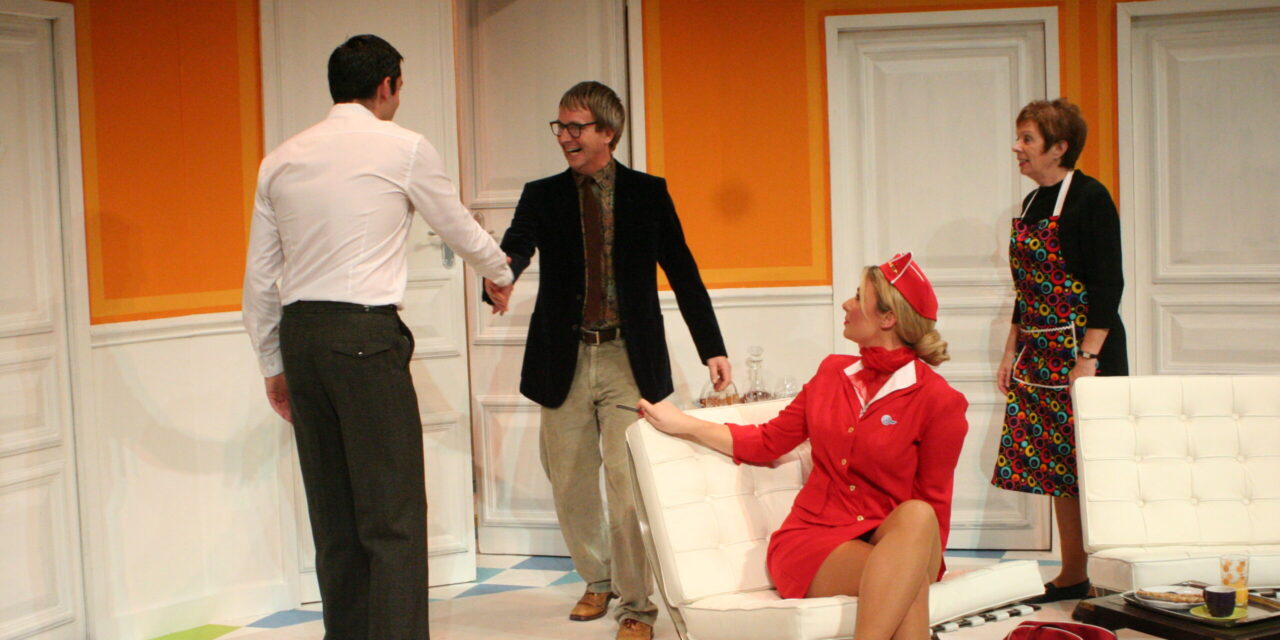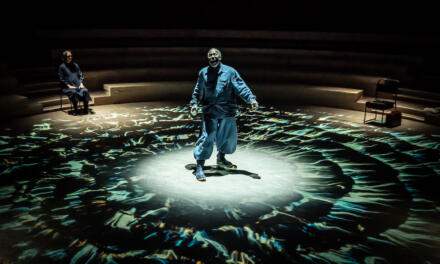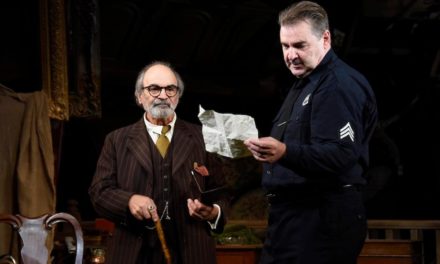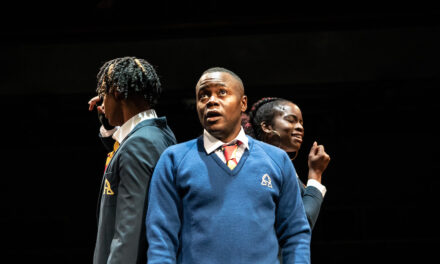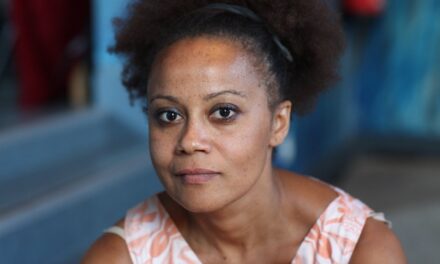What are the challenges in translating comedy for the stage? And how do you get your translation performed to a paying audience? Charlie Gobbett explains:
‘We’ve been doing this play in our acting evening class. It’s absolutely hilarious, and I thought it was right up your street!’ One of my oldest and dearest friends, John, an English expat living in France since 1990, was talking about Qui est Monsieur Schmitt? by Sébastien Thiéry, and he was right. The moment I read the play I knew I was going to have to translate it, to see if I could do justice to this accomplished comedy.
Eureka! The play’s the thing
As a keen amateur actor, my first love is comedy. And this call from my friend John triggered my Eureka! moment, when it occurred to me to try combining my profession of translator with my private obsession and hobby: theatre. Since then, I have speculatively translated three other plays, two of them comedies, and I am slowly making some progress in getting some of my work closer to theatre performance, which is of course what they were written for in the first place.
Three years of theatre-translation-focused continuing professional development (CPD) have taught me that getting anywhere with this professionally and – dare I say it – actually making any money out of it, is an uphill struggle. That’s especially the case for UK professional theatre, where new writing is often viewed with suspicion and reluctance by the money men (they are usually men), and theatre in translation doubly so.
However, as I know from personal experience, the UK also has a thriving amateur theatre scene – including many groups and companies who produce work of an extremely high standard. The licensing process for amateur performance is similar to that in professional theatre, with the theatre paying a fee for each public performance; the author gets the lion’s share of this, with the translator entitled to negotiated royalties and their name on the billing. It struck me that this could be a promising market for theatre in translation, especially if I chose the kind of play that would appeal to an educated, middle-class, middle-England audience. And what better candidate than a French comedy?
A play called L’Huître (literally ‘The Oyster’) by established French playwright Didier Caron caught my eye as being an excellent candidate. Caron became a household name in France with his film Un Vrai Bonheur (English title: The Wedding Day), adapted from one of the 18 plays he’s published in France. Several emails and phone calls later (along with the 20-plus hours’ work required to produce a workable draft), I had managed to secure the author’s enthusiastic endorsement of my text and his permission to try and get an amateur theatre group interested in staging it.
It was down to me to work and re-work the text to make it performance ready, which included a private reading with some of my amateur actor chums. This gave me some really helpful insight into the performability of my translation…and, above all, whether the jokes worked.
Getting the jokes across
Part Boulevard romp, part “old-school” comedy of manners, Kiss Me, Stupid! (my title) is the story of a retired estate agent and Lycra-clad cycling nut Bernard, who is convinced his wife of 35 years, Viviane, is having an affair. His solution is to hire pretty but none-too-bright actress Cindy to play his mistress to make Viviane jealous and fall back in love with him. But two can play at that game! Viviane realizes what Bernard is up to and pretends to be having an affair with her much younger work colleague Olivier. Will love and reason win through, or does Bernard’s obstinate refusal to realize how lucky he is condemn him to losing the woman he doesn’t deserve?
I submitted my text to the Play Selection Committee at my local amateur theatre group, the Nantwich Players – by no means a shoo-in – and eventually heard the news I’d been hoping for: it was programmed for May 2021, with me directing!
So, what were the challenges of translating this play? I can only cover some of the basics here, but I hope they provide some insight into the process of taking a translation from page to stage. Theatre translation differs from other forms of literary translation (except for performance poetry and the like) in that the text is written to be heard and not read. It’s also performed, in a way that even performance poetry isn’t. Movement, timing, rhythm and ‘speakability’ are all crucial aspects of a performance text, so a translation has to bear all this in mind.
In Kiss Me, Stupid! it was important to retain the author’s pacey and energetic no-holds-barred style of writing. The play is not a farce but has farcical elements, and one of the keys to a successful translation was to find neat (and funny) ways of translating the jeux de mots and comic cultural references that are everywhere while still retaining its inherent Frenchness, which always goes down well with UK audiences in this kind of comedy.
Puns and wordplay are a big part of the text. Cindy’s habit of getting hold of the wrong end of the stick is frequently used as a comic device. Some of the plays on words were tricky to translate, but very satisfying when I hit upon something that I felt worked in English:
French:
Viviane – Bonsoir les tourteraux ! (Literal : “lovebirds”)
Cindy – Bonsoir les tourteaux ! (Literal: “rock crabs”)
My version:
Viviane – Have a lovely evening with your beau!
Cindy – And you with your arrow!
In the following example, a play on words with “fromage” is sidestepped with a play on cards and dealing.
French:
Bernard – Bon, désolé, tu ne vas pas en faire un fromage ! (Literal: Ok, I’m sorry, you’re not going to make a cheese out of it” [overexaggerate its importance.])
Viviane – Un fromage non, mai un plateau de fromage, sûrement ! (Literal: Not a cheese, but a cheese platter, certainly!)
My version:
Bernard – All right, I’m sorry. It’s really not a big deal.
Viviane – It may not be a big deal to you, but I think it’s time we put our cards on the table!
When it comes to finding cultural equivalents, at times one has to hunt around for inspiration, and at others the original idea will work just as well in translation (especially if you assume your audience to be reasonably well-read):
French:
Cindy – Je sais ce que c’est qu’un livre ! Le Club des Cinq, tout ça, je connais. (À Viviane.) Vous connaissez ?
(Literal: I know what a book is! Le Club des Cinq [the French title of the The Famous Five], all that, I know it. (To Viviane.) Do you know it?)Viviane – Évidemment! Belle Plume! Mais aujourd’hui, je suis plus sur des auteurs comme Stendhal. Le Rouge et Le Noir par exemple – Vous l’avez lu ?
(Literal: Of course! Fine writing! But these days I am more into authors like Stendhal. The Red and the Black for example – Have you read it?)Cindy – Euh… oui, oui, bien sûr… enfin, j’ai lu que le Rouge pour l’instant, j’attaquerai le Noir plus tard, quand j’aurai du temps.
(Literal: Er… yes, yes, of course… I mean, I’ve only read the Red for now, I’ll start the Black later when I have time.)
My version:
Cindy – I know what a book is, thank you! The Famous Five, all that kind of stuff. (To Viviane.) Are you familiar with Enid Brighton*? [*I couldn’t resist the opportunity to get an extra laugh here.]
Viviane – Who isn’t? Such a literary talent! But these days I’m more into authors like Stendhal. The Red and the Black for example – have you read it?
Cindy – Er… Yes, yes, course I have! Well… I’ve read The Read**, it’s a very good read. But I haven’t got round to The Black yet.
[**Here, I added a further pun, for the cast’s benefit rather than the audience’s. The comedy of this section in English is given a leg up by the happy coincidence that “read” and “red” are homophones.]
Love nests and cheek kisses
Even when retaining the “Frenchness” of a play, it is sometimes necessary to relocate place names likely to be unfamiliar to a UK audience. A romantic weekend in Honfleur becomes a love nest in Rouen, and Olivier’s mother’s home in Hazebrouck (a town in northern France associated with industrial decline) was changed to Lille. I decided to transplant Bernard’s holiday to Bayonne in the Basque Country to Barcelona, with him returning in traditional Catalan costume instead of the Basque red beret and neckerchief described by the author. Over the top? Possibly, but I feel it’s important to maintain some level of cultural familiarity in my translation. This way, the narrative retains its French (or at least European) flavor but a UK audience will (hopefully) laugh rather than be baffled.
But what do you do with something as quintessentially French as la bise (the kissing-on-the-cheek custom of our Gallic neighbors)? After much mulling, I decided to keep it in (the characters and setting in the translation are French, after all) clarifying – for the benefit of director and actors, and ultimately the audience – the sociolinguistic significance of Bernard and Cindy doing this at this particular point in the play (just before the interval), enabling them to incorporate this into their characterization: “They do the bise – a peck on each cheek – as friends.”
And what do you do if something is simply untranslatable? One solution is to translate something mundane at the same point more creatively to prompt an alternative laugh. At one point, I have Cindy ‘weighing up the frozen scones’ (skonz) when trying to decide on a course of action (“peser le pour et le contre”).
In case you’re wondering, at the end of Kiss Me, Stupid!, Bernard does come to realize what a chump he’s been and he and Viviane are reconciled, while Cindy and Olivier fall for each other – and they all live happily ever after…
Getting onto the stage
And because a play is ultimately a performance, not just a script on the page, there will be more changes to come. The rehearsal process informs the ‘performability’ of the translation, and the translation informs what the actors do with the text, creating a virtuous circle. The translator can thus assume the role of dramaturg, and their presence in rehearsals is important (but sadly rare in professional theatre).
Disappointingly, the coronavirus situation has caused the Nantwich Players’ scheduled 2020/21 season to be cut drastically. Kiss Me, Stupid! is one of the casualties, with production postponed until 2021/22. But when this production finally gets off the ground, I will at least be in place as both translator and director, and I am hoping for valuable input from my cast in creating what our audiences ultimately come to see.
Charlie Gobbett is a creative translator who has been working in high-end consumer products, popular science, the travel industry and many other fields for over 20 years. He is an emerging French theatre translator, and his first play in translation will be staged in 2021/22. He would love to make a living from theatre translation but is not sure if anyone actually does…
This article was originally published in the Bulletin of the Great Britain Institute of Translating and Interpreting. It was reposted with permission.
This post was written by the author in their personal capacity.The opinions expressed in this article are the author’s own and do not reflect the view of The Theatre Times, their staff or collaborators.
This post was written by Charlie Gobbett.
The views expressed here belong to the author and do not necessarily reflect our views and opinions.

